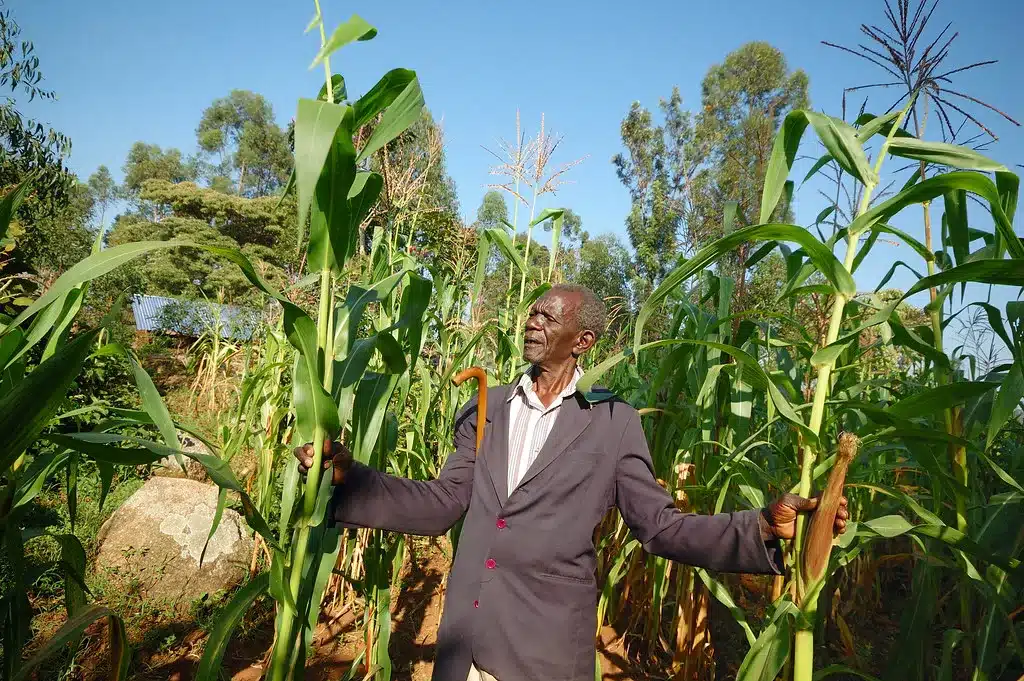Many African communities lack the capacity to respond or adapt to the impacts of climate change, leaving the continent vulnerable to changing conditions. Warming trends have already become evident across the African continent, along with changes in precipitation patterns. Increasing temperatures and changes in rainfall put even more pressure on strained African agricultural systems. Pressures from pests, weeds and diseases are also expected to increase. These changes can have detrimental and even devastating effects on crops and livestock.
Why is African agriculture vulnerable to climate change?
Africa has the world’s highest population growth rate and is seeing rapid urbanisation trends and rising GDP. This places pressure on Africa’s agricultural systems, which need to provide for growing, urbanising populations in the face of challenges such as climate change.
Simply put, there are two reasons why Africa is one of the most highly-affected continents when it comes to climate change:
- Its geographical characteristics
- The limited human, social and economic capacity to adapt to the impacts of climate change.
Here’s why:
- The majority of Africa’s farmers are small-scale farmers
- Few financial resources
- Limited access to infrastructure and information
- Agricultural systems remain largely rain-fed and underdeveloped
- Decision makers do not have enough appropriate data/information available on climate variability and change
- Poor co-ordination among organisations and departments involved in climate change adaptation
- Lack of consistent communication of climate information to farmers.
The impact of climate change on agriculture
Climate change has a significant impact on agricultural systems since it affects both plant and animal health. Especially in Africa, agriculture is dependent on biophysical characteristics such as soil type and fertility, water and temperature. In livestock farming, the prevailing climate conditions impact the growth of feed and forage, and water availability for animals. Under climate change, pressures from pests, weeds and diseases are also expected to increase.
Climate change impacts on maize in South AfricaMaize is South Africa’s staple food crop. Millions of people rely on maize to meet their food security needs. Most studies confirm that climate change will cause a decrease in the country’s maize yields. Akpalu et al. (2008) find that a 10% reduction in precipitation reduces the mean maize yield by approximately 4%, which could have devastating long-term effects on South African maize production. |
How African agriculture can become more resilient
Successful climate change adaptation in the African context is dependent on building systemic resilience. But there’s no ‘one-size-fits-all’ adaptation strategy that can meet the needs of all communities and contexts. The impacts of climate change in Africa will not be felt universally – there are vast disparities between developed and under-developed farms, as well as different regional climate change patterns.
Nevertheless, broad strategic objectives include:
- Increasing agricultural productivity sustainably – this will support development, food security and farm incomes.
- Reducing agricultural greenhouse gas emissions – including livestock, crops and fisheries.
- Adapting and building resilience of agricultural and food security systems – helping the continent\s agriculture to deal with climate change at multiple levels.
Sustainable solutions
Small-scale and industrial farmers in Africa are increasingly adopting a variety of agroecological and sustainable practices, such as:
- Agroforestry (trees cultivated in conjunction with crops or pastures)
- Contouring
- Terracing
- Mulching
- No-till
- Crop rotation
- Cover cropping
The benefits of these practices is that they lower carbon emissions while helping farmers adapt to climate change.
At the heart of sustainable, resilient agriculture is soil health. A healthy soil with sufficient organic matter can hold water and resist soil erosion. It’s also more fertile and productive than soil which has been degraded by conventional farming practices. For this reason, adopting farming methods that regenerate soil helps to minimise the effects of climate change.
Building up soil organic matter remains crucial to the sustainability of farming and food production. At Zylem, we focus on building healthy soils according to a farm’s unique circumstances.
Find out more about our services and solutions
Contact us on 033 347 2893 or send your enquiry to admin@zylemsa.co.za.

About the Author: Alex Platt
Alex is Business Development Manager at Zylem. He’s inspired by the potential of regenerative farming and takes a special interest in the technology and products that are moving agriculture in a more sustainable direction.

